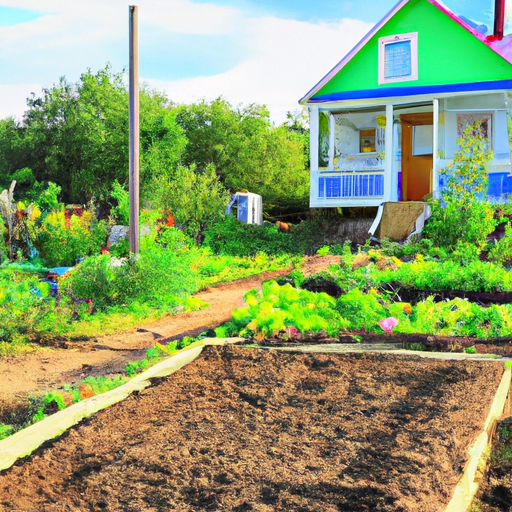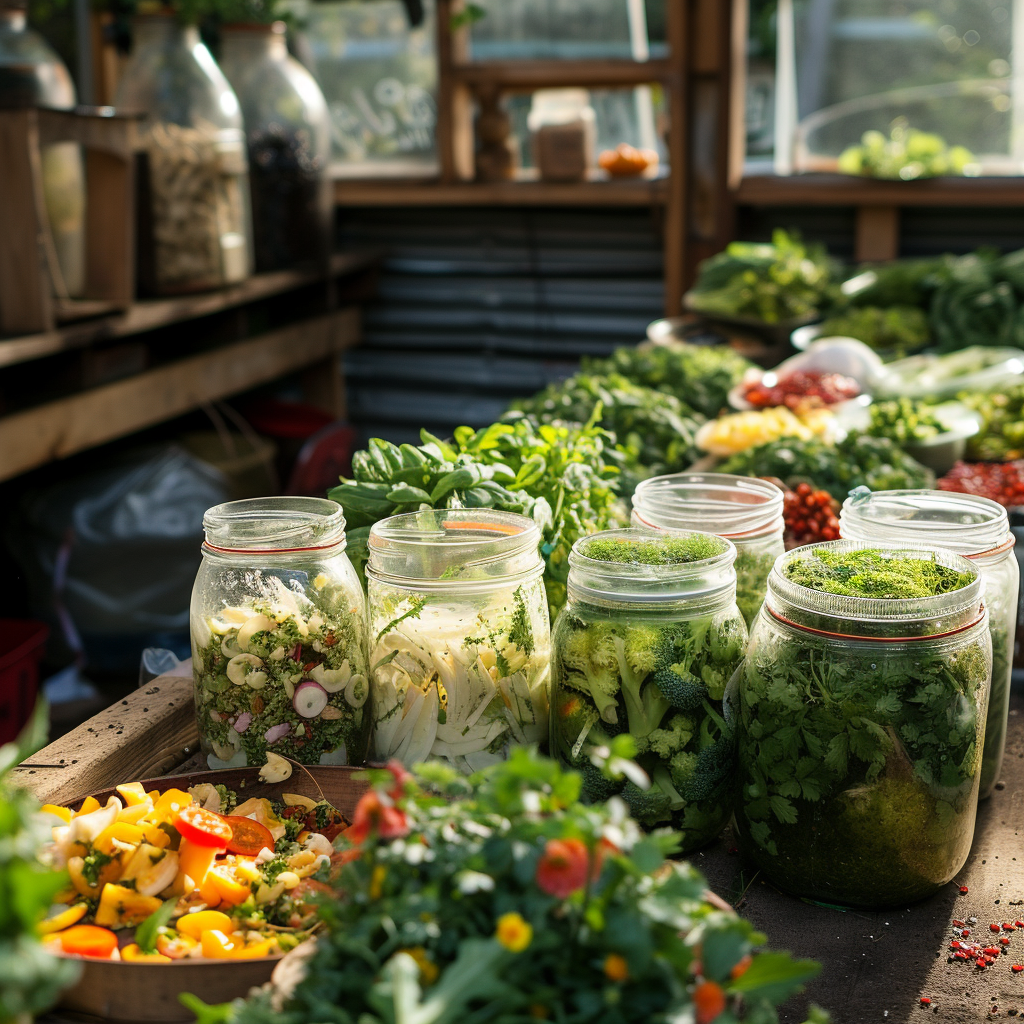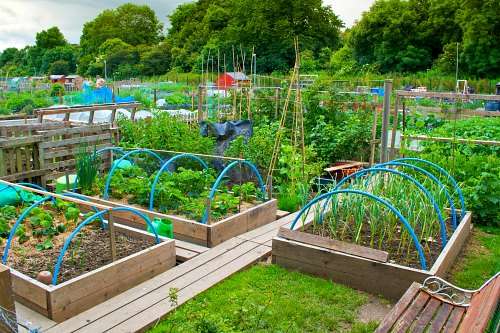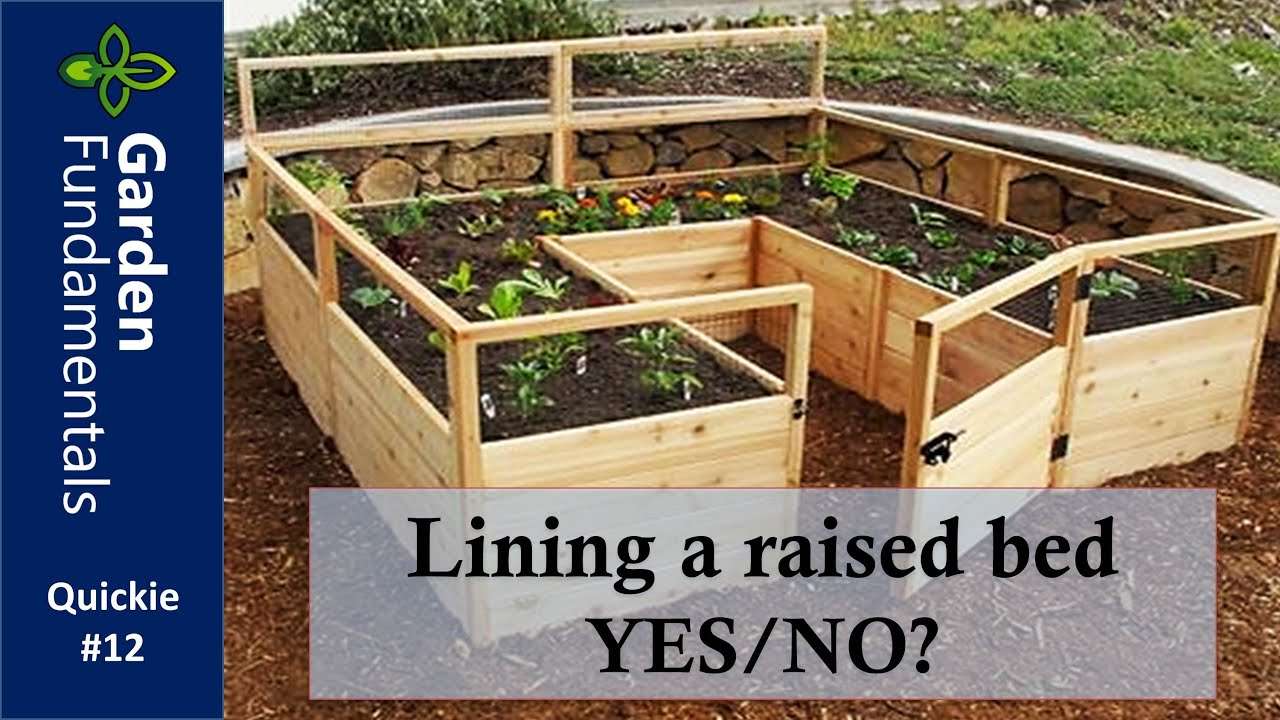Living off-grid has become a popular choice for many people seeking a self-sustainable lifestyle, but can you still have a thriving garden or farm without relying on traditional utilities? In this article, I will explore the possibilities of cultivating your own produce and raising livestock off-grid, discussing the challenges and potential solutions for those looking to embrace a more self-sufficient way of life.
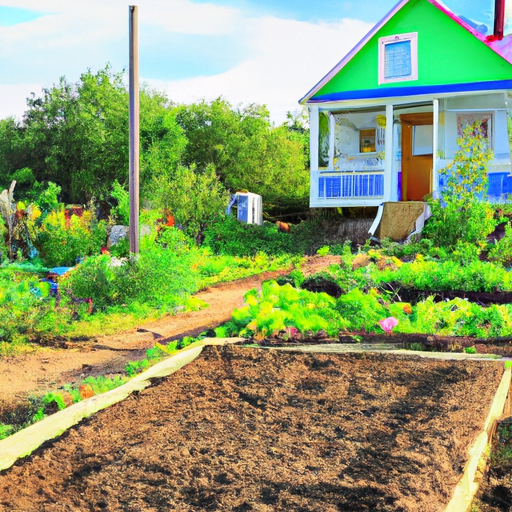
Benefits of having a garden or farm off-grid
Sustainability
When you have a garden or farm off-grid, you are able to cultivate your own food and resources in a sustainable manner. By disconnecting from the conventional power grid and sourcing your own energy and water, you reduce your dependence on external resources. This promotes long-term environmental sustainability by minimizing your carbon footprint and reducing the strain on natural resources.
Self-sufficiency
One of the greatest advantages of having an off-grid garden or farm is the ability to become more self-sufficient. Growing your own food means you have direct control over the quality and safety of what you consume. Additionally, the skills and knowledge required to successfully operate an off-grid garden or farm can be empowering, providing a sense of self-reliance and independence.
Food security
Having a garden or farm off-grid ensures that you have a consistent and reliable source of fresh food. In times of crisis, such as natural disasters or disruptions in the food supply chain, your off-grid garden can provide you with a vital source of sustenance. This enhanced food security can alleviate concerns and provide peace of mind, knowing that you can rely on your own resources for sustenance.
Health benefits
Growing your own fruits, vegetables, and herbs in an off-grid garden can have a direct impact on your health. Freshly harvested produce is often more nutrient-rich compared to store-bought counterparts, which may have lost some of their nutritional value due to prolonged storage and transportation. Additionally, gardening is a physical activity that can improve fitness levels and reduce stress, promoting overall well-being.
Cost savings
Maintaining an off-grid garden or farm can result in substantial cost savings over time. By producing your own food, you significantly reduce grocery bills and the need to purchase expensive organic produce. Furthermore, generating your own energy through renewable sources such as solar or wind power can significantly lower or even eliminate your electricity bills. With proper planning and management, an off-grid garden or farm can ultimately be a cost-effective solution in the long run.
Factors to consider for an off-grid garden or farm
Location
Choosing the right location for your off-grid garden or farm is crucial for its success. Factors to consider include access to sunlight, proximity to water sources, and the presence of natural elements such as trees or buildings that may provide shade or protection. Assess the microclimates on your property and identify areas where plants can thrive based on their specific sunlight and temperature requirements.
Water supply
Ensuring an adequate and sustainable water supply is essential for an off-grid garden. Consider options such as rainwater harvesting, tapping into natural water sources like ponds or wells, or utilizing greywater recycling systems. Plan for storage solutions to retain water during dry periods, and implement efficient irrigation techniques to minimize water wastage.
Soil quality
The quality of the soil in your off-grid garden or farm directly impacts the health and productivity of your plants. Conduct soil tests to assess its composition, fertility, and pH levels. Depending on the results, you may need to amend the soil with organic matter, such as compost or manure, to improve its structure and nutrient content. Proper soil management techniques, like mulching or cover cropping, can also help retain moisture and prevent erosion.
Climate
The climate in your region plays a significant role in determining which plants will thrive in your off-grid garden or farm. Consider the average temperature range, frost dates, and the length of the growing season. Select plant varieties that are well-adapted to your specific climate conditions to maximize their chances of success. Incorporating structures like greenhouses or cold frames can extend the growing season and protect delicate plants from harsh weather conditions.
Sunlight availability
Sunlight is an essential factor for the successful growth of plants. Assess the intensity and duration of sunlight in different areas of your off-grid garden or farm to determine the best placement for different plant types. Leafy greens, for example, can tolerate partial shade, while fruiting plants like tomatoes require full sun exposure. Understanding the sunlight patterns on your property will help you make informed decisions regarding plant placement and optimize their growth.
Choosing the right plants for an off-grid garden
Native or adapted species
Choosing native or adapted plant species for your off-grid garden or farm is a wise choice for several reasons. Native plants are well-suited to the local climate, soil, and ecosystem, making them more resilient and likely to thrive. They also support local wildlife and pollinators, contributing to the overall biodiversity of your garden. Adapted species, on the other hand, are non-native plants that have shown the ability to adapt and thrive in your region’s conditions.
Drought-tolerant plants
Water conservation is vital in off-grid gardening, making drought-tolerant plants an excellent choice. These plants have adaptive mechanisms that allow them to withstand long periods without much water. Examples include succulents, lavender, rosemary, and certain types of grasses. By selecting drought-tolerant plants, you can minimize water usage without sacrificing the aesthetic appeal of your garden.
Companion planting
Companion planting involves strategically pairing plants that benefit each other when grown together. For instance, planting marigolds alongside vegetables can help repel pests and attract beneficial insects like bees and ladybugs. Some plants also release natural compounds that deter specific pests, reducing the need for chemical pesticides. Companion planting not only enhances pest control but can also improve soil fertility through nitrogen fixation and nutrient cycling.
Perennial crops
Incorporating perennial crops into your off-grid garden or farm can provide long-term benefits. Perennials, such as fruit trees, berry bushes, and perennial herbs, have a longer lifespan and require less maintenance compared to annual plants. They can also contribute to soil health by preventing erosion and providing year-round ground cover. While perennials may take longer to establish, they provide a stable and consistent source of food over the years.
Seed-saving varieties
Choosing seed-saving varieties for your off-grid garden or farm enables you to preserve and propagate your own seeds for future plantings. This practice promotes seed diversity and self-reliance by reducing reliance on commercial seed suppliers. By saving seeds from plants that have adapted to your specific growing conditions, you can cultivate varieties that are better suited to your environment and improve their resilience over time.
Managing pests and diseases off-grid
Integrated pest management
Integrated pest management (IPM) is an effective approach to pest control that emphasizes ecological balance and minimizes the use of pesticides. Implementing IPM techniques in your off-grid garden or farm involves regularly monitoring for pests, identifying their natural predators, and using physical or mechanical methods to manage pest populations. This may include hand-picking pests, introducing beneficial insects, or erecting barriers to prevent pest infestations.
Natural repellents
Using natural repellents is an eco-friendly way to deter pests without harmful chemicals. For example, planting marigolds or citronella plants can repel mosquitoes, while garlic or chives may deter aphids and other insects. Various essential oils, such as neem oil or peppermint oil, can also be used as natural sprays to combat pests. These natural repellents offer an alternative to traditional pesticides while minimizing potential harm to beneficial insects and pollinators.
Beneficial insects
Attracting beneficial insects is an essential component of pest management in an off-grid garden or farm. Ladybugs, lacewings, and hoverflies are examples of beneficial insects that feed on pests like aphids, mites, and caterpillars. Planting flowers such as daisies, yarrow, or alyssum can attract these beneficial insects, creating a diverse and balanced ecosystem. Avoiding the use of broad-spectrum pesticides is crucial to preserve the populations of these valuable allies.
Crop rotation
Crop rotation is a time-tested farming practice that involves changing the location of crops within your off-grid garden or farm each season. This method helps control pests and diseases by disrupting their life cycles. Different plant families have varying nutrient requirements and are susceptible to different pests and diseases. By rotating crops, you can prevent the buildup of specific pests or diseases, maintain soil fertility, and promote overall plant health.
Compost and healthy soil
Building and maintaining healthy soil through composting is essential for the long-term success of your off-grid garden or farm. Compost improves soil structure, enhances nutrient retention, and promotes beneficial microbial activity. Healthy soil is less susceptible to disease and supports robust plant growth, reducing the likelihood of pest infestations. Utilize kitchen scraps, yard waste, and livestock manure to create nutrient-rich compost that will nourish your plants and contribute to a thriving ecosystem.
Watering techniques and conservation
Rainwater harvesting
Rainwater harvesting is a sustainable solution for watering your off-grid garden or farm. Collecting rainwater can be as simple as placing containers under downspouts or more complex, utilizing rainwater storage tanks or cisterns. This harvested water can then be used during dry periods or for irrigation purposes. Rainwater is naturally free from chlorine and other chemicals found in tap water, making it beneficial for plants and reducing water usage from other sources.
Drip irrigation systems
Drip irrigation is an efficient watering technique that minimizes water wastage by delivering water directly to the plant roots. This method involves using a network of tubes or pipes with small emitters spaced along them, which release water slowly and directly onto the soil surface. Drip irrigation systems prevent excessive evaporation, reduce weed growth, and ensure plants receive water precisely where it is needed, resulting in optimized plant health and water conservation.
Mulching
Mulching is a simple yet effective technique for conserving water in an off-grid garden or farm. Applying a layer of organic mulch, such as wood chips, straw, or leaves, around plants helps retain moisture in the soil, reducing evaporation. Mulch also acts as a natural weed suppressant, reducing competition for water and nutrients. Additionally, as the organic mulch decomposes, it enriches the soil with valuable organic matter, improving its structure and fertility.
Watering schedules
Establishing a watering schedule that matches the specific needs of your plants is crucial for optimal growth and water conservation. Consider the water requirements of different plant varieties and adjust watering frequencies accordingly. Early morning or late afternoon is the best time to water, as it allows moisture to penetrate the soil before the heat of the day causes excessive evaporation. Regularly monitor soil moisture levels to ensure plants receive adequate hydration without overwatering.
Greywater recycling
Recycling greywater from household activities, such as dishwashing or showering, can be an effective way to conserve water in an off-grid garden or farm. Greywater systems capture and treat water from non-toilet sources, making it suitable for irrigation purposes. This sustainable practice reduces freshwater consumption and provides an additional source of water for your plants. However, it is essential to use biodegradable, environmentally-friendly soaps and detergents to prevent harmful chemicals from entering the soil.
Creating a self-sustaining ecosystem
Building healthy soil
Developing and maintaining healthy soil is the foundation of creating a self-sustaining ecosystem in your off-grid garden or farm. Prioritize soil health by incorporating organic matter through the use of compost, cover crops, and animal manure. These additions promote nutrient cycling, enhance soil structure, and support a diverse community of beneficial microorganisms. By focusing on soil health, you establish the conditions for thriving plants and the overall health of your ecosystem.
Intercropping and polyculture
Intercropping and polyculture are planting techniques that involve growing multiple plant species together in the same space. By mixing plants with different growth habits, root depths, and nutrient requirements, you maximize resource utilization and minimize pest and disease risks. For example, intercropping nitrogen-fixing plants like legumes with heavy feeders can provide an ongoing source of nutrients and reduce the need for external fertilizers.
Using animal manure
Utilizing animal manure as a natural fertilizer can enrich the soil and promote plant growth in your off-grid garden or farm. Manure provides essential nutrients, organic matter, and beneficial microorganisms that contribute to soil fertility. Incorporating well-aged and composted manure into your soil can enhance nutrient availability, improve soil structure, and increase water-holding capacity. However, it is important to properly compost manure to minimize the risk of introducing pathogens or weed seeds.
Attracting beneficial wildlife
Encouraging beneficial wildlife, such as birds, bees, butterflies, and other pollinators, is crucial for the successful operation of an off-grid garden or farm. These creatures play a vital role in pollination and pest control, enhancing biodiversity and ecosystem resilience. Create habitat features like birdhouses, bat boxes, or pollinator-friendly areas with native flowering plants to attract and support beneficial wildlife. Providing food, water, and shelter will help maintain a balanced and thriving ecosystem.
Creating a composting system
Implementing a composting system in your off-grid garden or farm allows you to recycle organic waste and create nutrient-rich compost for your plants. Composting involves the decomposition of organic materials, such as kitchen scraps, yard waste, and plant residues, into a dark and crumbly soil amendment. Establish a composting area or bin where these materials can be layered and turned regularly to facilitate the decomposition process. By composting, you reduce waste, close the nutrient loop, and minimize the need for external fertilizers.
Off-grid farming methods
Aquaponics
Aquaponics is an innovative off-grid farming method that combines aquaculture (fish farming) with hydroponics (soil-less plant cultivation). In an aquaponic system, fish waste provides nutrients for the plants, while the plants filter and purify the water for the fish. This symbiotic relationship allows for significant water conservation and the production of both fish and fresh vegetables in a recirculating system. Aquaponics is ideal for areas with limited access to arable land or water resources.
Permaculture
Permaculture is an ecological design approach that aims to create self-sustaining and regenerative systems. It involves maximizing resource efficiency, promoting biodiversity, and integrating different elements, such as plants, animals, and structures, to create harmonious interactions. By following permaculture principles, such as stacking functions, using renewable resources, and implementing natural patterns, you can create a highly productive and resilient off-grid farm or garden with minimal external inputs.
Vertical farming
Vertical farming is a space-efficient off-grid farming method that involves growing plants in vertically stacked layers or structures. This method utilizes vertical space, making it suitable for urban or small-scale off-grid farming. Vertical farming often incorporates hydroponics or aeroponics, which allow plants to grow without soil. By optimizing light, temperature, and nutrient delivery, vertical farming systems can produce a high yield of fresh produce while conserving water and minimizing resource usage.
Hydroponics
Hydroponics is a soil-less cultivation method that involves growing plants in nutrient-rich water solutions. In a hydroponic system, plants receive essential nutrients directly through their root systems, eliminating the need for soil. This method promotes efficient water usage and maximizes nutrient uptake, resulting in faster growth rates and higher crop yields. Hydroponics is particularly suitable for off-grid gardening, as it can be adapted to various scales and environmental conditions.
Biointensive gardening
Biointensive gardening is a compact and high-yielding off-grid farming method that focuses on intensive plant spacing, composting, and soil improvement techniques. This method aims to produce maximum yields in minimal space while minimizing resource inputs. By closely spacing plants and enriching the soil with compost, biointensive gardening maximizes productivity and reduces water usage. Additionally, this method emphasizes biodiversity and companion planting to enhance natural pest control and soil health.
Energy sources for off-grid gardening or farming
Solar power
Solar power is a renewable energy source that can effectively power an off-grid garden or farm. Photovoltaic (PV) panels convert sunlight into electricity, which can be used to power water pumps, irrigation systems, or other electrical equipment. Excess energy can be stored in batteries for use during periods of low sunlight. Solar power provides an environmentally-friendly and reliable energy source, reducing dependency on fossil fuels and lowering greenhouse gas emissions.
Wind power
Wind power is another viable off-grid energy source for gardening or farming. A wind turbine harnesses the kinetic energy of the wind and converts it into electricity. Wind power is particularly useful in areas with consistent and sufficient wind speeds. The generated electricity can be used for powering irrigation systems, greenhouse fans, or other electrical devices. When combined with solar power, wind power enhances system reliability and reduces dependence on a single energy source.
Biofuel
Biofuel can be produced from organic materials, such as plant biomass or animal waste, and utilized as an off-grid energy source. By converting biomass into biofuel, such as biodiesel or biogas, you can generate energy for various applications, including fueling machinery or heating systems. Biofuel offers a sustainable and renewable alternative to fossil fuels, reducing greenhouse gas emissions and contributing to a more environmentally-friendly off-grid gardening or farming operation.
Human and animal power
In an off-grid garden or farm, human and animal power can be utilized for tasks that require physical effort. Traditional methods like hand tilling, hoeing, or pulling carts can be effective ways to reduce dependency on fossil fuel-powered machinery. Utilizing animals, such as horses or oxen, for plowing or pulling heavy loads, can also be environmentally-friendly and sustainable. Human and animal power not only reduce reliance on external energy sources but also provide an opportunity for physical exercise and strengthen the bond between humans and animals.
Micro-hydro systems
Micro-hydro systems harness the kinetic energy of moving water to generate electricity. By diverting a portion of a river or utilizing water from a natural stream or spring, you can create a sustainable energy source for an off-grid garden or farm. The flowing water spins a turbine, which generates electricity that can be used to power various electrical devices. Micro-hydro systems are ideal for properties with a reliable and consistent water source, providing a continuous and renewable energy supply.
Challenges and limitations of off-grid gardening
Limited space
Off-grid gardening or farming can be challenging if you have limited space available. Urban environments or small plots may have restrictions on the size or type of agricultural activities. However, innovative techniques such as vertical farming, container gardening, or rooftop gardens can help maximize space utilization and make off-grid gardening feasible even in constrained areas.
Seasonal variations
The changing seasons and fluctuations in climate can pose challenges for off-grid gardening or farming. Cold winters, hot summers, or erratic weather patterns can impact plant growth and require additional measures to protect crops. Strategies such as season extension techniques, greenhouse cultivation, or adapting planting schedules to suit local conditions can help to mitigate the effects of seasonal variations and ensure a consistent harvest throughout the year.
Lack of equipment
Being off-grid may limit access to modern agricultural equipment, which can make certain tasks more labor-intensive or time-consuming. Mechanized equipment that relies on electricity or fuel may not be feasible in off-grid settings. However, alternative tools and techniques, such as hand tools, animal-powered machinery, or manual labor, can be utilized to overcome equipment limitations and successfully manage your off-grid garden or farm.
Initial setup costs
Establishing an off-grid garden or farm often involves upfront costs for equipment, infrastructure, and renewable energy systems. Solar panels, wind turbines, water storage tanks, or composting systems require financial investment. However, it is important to consider these costs as long-term investments that can result in significant cost savings over time. Additionally, by starting small and gradually expanding your off-grid operations, you can minimize upfront expenses and spread the financial impact.
Knowledge and skills
Operating an off-grid garden or farm requires a certain level of knowledge and skills in areas such as gardening, sustainable practices, water management, and renewable energy systems. Understanding plant requirements, composting techniques, or efficient irrigation methods is essential for success. However, these skills can be acquired through self-study, workshops, or by connecting with experienced off-grid gardeners or farmers. Continuous learning and experimentation will improve your abilities and ensure the sustainability of your off-grid operation.
Successful examples of off-grid gardening or farming
Case study 1: The self-sufficient homestead
In this case study, a family living in a remote location decided to become self-sufficient by developing an off-grid garden and farm. They focused on growing a wide variety of vegetables, fruits, and herbs using organic and permaculture principles. Compost, animal manure, and cover crops were used to improve soil fertility and structure. Additionally, rainwater harvesting and drip irrigation systems were installed to ensure sustainable water usage. With proper planning, resource management, and continuous learning, they successfully created a self-sufficient and resilient off-grid homestead.
Case study 2: The urban rooftop garden
In this case study, an environmentally-conscious urban dweller transformed their rooftop into a productive off-grid garden. Limited space was overcome by using vertical farming techniques and container gardening. A combination of edible plants, herbs, and microgreens were grown using hydroponics and drip irrigation systems. The individual implemented renewable energy sources, such as solar panels, to power the irrigation system and other electrical devices. By harnessing available resources and adopting sustainable practices, they demonstrated how urban spaces can be utilized for off-grid gardening with minimal environmental impact.
Case study 3: The permaculture farm
In this case study, a farmer established a permaculture farm to cultivate food in harmony with nature. The farm incorporated various permaculture principles, such as polyculture, companion planting, and soil improvement techniques. Animals, such as chickens and goats, were integrated into the system to provide manure for composting and contribute to pest control. A biodigester was installed to convert animal waste into biogas, which fueled the cooking and heating needs of the farm. By following permaculture principles and utilizing renewable energy sources, the permaculture farm showcased a self-sustaining and regenerative approach to off-grid farming.
Case study 4: The off-grid greenhouse
In this case study, an off-grid greenhouse was created to extend the growing season and provide a climate-controlled environment for delicate plants. The greenhouse utilized solar panels and micro-hydro systems to generate electricity for heating, ventilation, and lighting. Rainwater harvesting techniques were employed to ensure a sustainable water supply. By implementing advanced technologies and optimizing energy usage, the off-grid greenhouse demonstrated how controlled environments can be created off-grid, enabling year-round cultivation and resource conservation.
Case study 5: The sustainable community garden
In this case study, a sustainable community garden was established to promote food security and self-sufficiency among community members. The garden utilized a combination of rainwater harvesting, composting, and organic gardening techniques. Community members collaborated to maintain the garden, share knowledge and resources, and establish a reliable source of fresh produce. By fostering a sense of community and collective action, the sustainable community garden exemplified the power of collaboration and sustainable practices in off-grid gardening.

